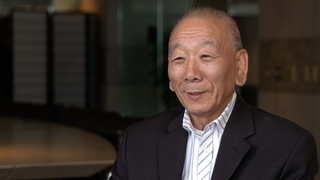Interviews
The importance of learning cultural diversity (Spanish)
(Spanish) I am interested generally in [getting] acquainted [with this] diversity [of cultures]. It seems to me that it is fundamental to know other, distinct things from your own; if you like the rérmino, in order to be able to grow as a person, to be able to understand more things. Therefore, precisely [I am a] product of a mix my own existence; because part of my father is Quechua, and of my mother is all Japanese. To be really mixed gives me the possibility of knowing two absolutely distinct cultures. What I like about [being a product of two distinct cultures], is that it opens the mind and you realize that the reality in which you live is not the only possible reality and that there are thousands [of] diverse ways of seeing things and of thinking of things. It seems to me that [this] is fundamental. By choosing your own way of seeing things, or it appears that some things are good or are not good…the important thing is, and the richness of the experience at any rate is to realize that [all] diversity exists.
Date: July 12, 2006
Location: Buenos Aires, Argentina
Interviewer: Takeshi Nishimura, Ricardo Hokama
Contributed by: Centro Nikkei Argentino
Explore More Videos


Conflicted about immigrating to America (Japanese)
(b. 1925) War bride

Defining "Nikkei"
(1941-2018) Japanese Canadian photojournalist and activist

Unique Identity from Having Multiple Backgrounds
(b. 1938) Philipines-born hikiagesha who later migrated to the United States.

Difficulty of spreading authentic sushi (Japanese)
(b. 1949) Sushi chef. Owner of Sushi Gen restaurant in Los Angeles’ Little Tokyo.

Teaching how to eat sushi (Japanese)
(b. 1949) Sushi chef. Owner of Sushi Gen restaurant in Los Angeles’ Little Tokyo.

Growing up Japanese in Hawaii
(b. 1952) Former banking executive, born in Hawaii



Parents identification as Peruvian Okinawan
Okinawan American whose parents are from Peru.

Okinawan cultural appreciation
Okinawan American whose parents are from Peru.

Prejudice against Okinawans from mainland folks
Okinawan American whose parents are from Peru.

American values she aligns with
Okinawan American whose parents are from Peru.

Working together in Okinawa using three languages
Okinawan American whose parents are from Peru.

Expressing herself through poetry
(b. 1923) Japanese American poet, activist
